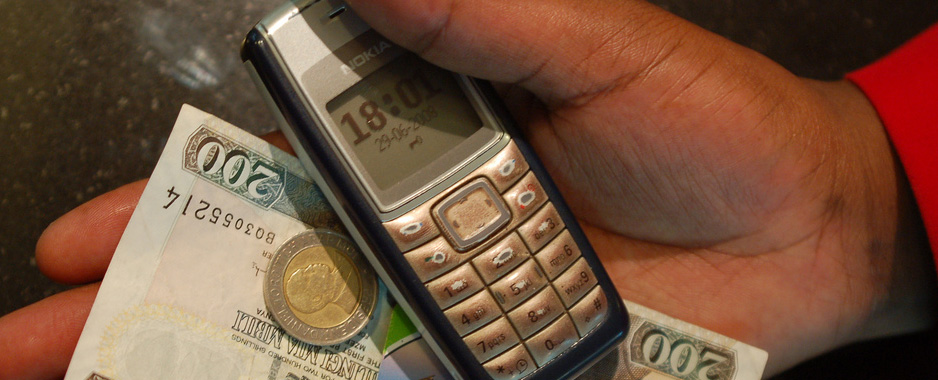
Cape Town-based start-up IMB’s tagline is “more than a bank”, and that’s because banking services are only a small part of what it offers. Its main focus is making payments, and particularly mobile payments, easier for consumers and merchants in a way it claims benefits both.
IMB, which stands for Internet Mobile Banking, as been up and running since June. Chief information officer Jamie Godwin says the company behind IMB, Star120, has been in the digital wallet and prepaid business for five years, but only decided to enter the banking space last December.
The initial impetus to start the company came when Godwin realised many people, like mobile games developers, were having to use services like premium rated SMS messages in order to get money from those without credit cards. Also, Godwin says he thought it was problematic that people needed a credit card in order to shop online.
Godwin says Visa, MasterCard and the banks “control how people pay for things and we wanted to change that”.
Godwin first got into the technology game running an Internet service provider business he later sold. He then opened a developer business where he met IMB’s CEO, Tim Colman. Colman implemented UK supermarket Tesco’s rewards system.
At first the two men wanted to figure out how to do mobile transactions using a debit card, but they realised the limitations of that approach — and met resistance from SA banks.
IMB allows websites and bricks-and-mortar merchants to receive payments via customers’ mobile phones. The merchant signs up with IMB for a store ID and consumers then use this to make payments to the merchant.
In addition to its e-commerce gateways for website and real-world merchants, IMB is developing an e-commerce application programming interface. “We want to get users on board and let them play around with ideas about how payments can happen,” says Godwin.
Any transaction within the IMB system — for example, one user paying another — is free. However, a transaction that leaves the IMB system to, say, another bank incurs a charge of about R3,30 because other banks charge it for these services.
In an unconventional move, IMB doesn’t subscribe to the traditional merchant fees model that most banks use for their point-of-sale services. Rather than a fixed fee, merchants pay what Godwin calls a “karma transaction” fee whereby the merchant chooses how much of a fee is appropriate. Consequently, merchants can choose not to pay a fee at all.
Though there’s no fee for setting up an IMB account, no monthly fees, and no transaction fees for transactions within the IMB system, those users wanting a traditional bank card will be charged a fee.
Those wanting to get money into their IMB account can make cash deposits at post offices or Absa branches, and Godwin says Standard Bank will soon be an option, too.
Godwin says the company has had a great deal of interest from “smaller mobile-based solutions looking to cater to generation Y, particularly content suppliers currently using premium SMS”. He says IMB has made it possible for many of them to slash their prices.
According to Godwin, much-hyped services like near-field communications — a short-range wireless technology — offer no advantage to the merchant or the consumer as they still include a merchant fee of up to 7%.
“If we can change the network, and the way people think about transactions, then we’ll see a huge adoption of mobile payments because merchants will drive sales themselves and will be able to offer discounts via the fees saved.”
But is IMB viable as a banking alternative? “As a banking option, it’s completely usable. You can receive deposits in an IMB account, you can pay beneficiaries, and you can search for other users and transact with them,” says Godwin.
He says IMB doesn’t want to replace banking, but wants “to sit in front of it”. He says many people still don’t trust mobile payments and that, for now, IMB is trying to convince people to just put “transactional money” in an IMB account “until we can prove the safety of the service and the mobile economy gains consumers’ trust”.
Godwin doesn’t think mobile payments will take off for another few years because of the time it takes to gain consumers’ trust. He adds that for those looking at mobile solutions, generation Y is the best target because it “understands the space” and can help facilitate mainstream uptake.
IMB has around 8 000 active users and its biggest deposit to date has been R500 000. Its banking partner is a company called Terzogenix.
“Banking costs are horrendous in SA,” says Godwin. Aside from wanting to change this, he says IMB is also interested in “community-based money”. He says there’s potential for multiple systems of transacting and dealing with money, including “bartering and community-based currencies”.
He says payroll companies have also expressed interest in the service, particularly those with drivers collecting cash and those looking to bill customers for small amounts or do business-to-business payments.
“We also want to make banking social,” says Godwin. “You should be able to send a tweet to the system for your balance, or receive a tweet about a payment, or thank someone for a payment with a tweet. There are lots of ways we can make banking a more social activity.” — Craig Wilson, TechCentral
This section on TechCentral focuses on technology start-ups in SA. The purpose is to profile what our start-up entrepreneurs are doing and to highlight some of the interesting technology ideas coming out of SA. Do you have an interesting tech start-up? Are you doing something out of the ordinary? Why not drop TechCentral a line and tell us about what you’re doing?
- Subscribe to our free daily newsletter
- Follow us on Twitter or on Google+ or on Facebook
- Visit our sister website, SportsCentral (still in beta)


